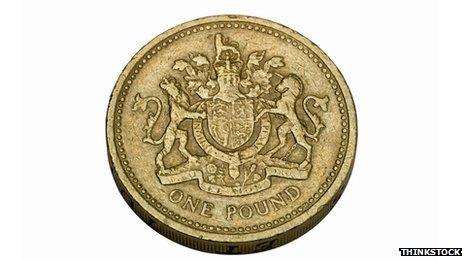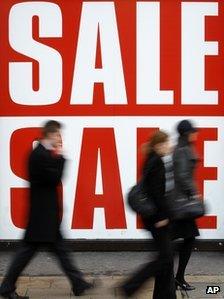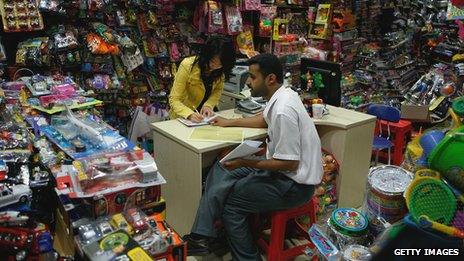How did pound shops change the UK?
- Published

Pound shops have proliferated through the British High Street but have they changed the way people shop?
The pound shop owes its existence to American retail pioneer Frank Winfield Woolworth.
An apprentice in a general store with a bargain table for reduced and damaged goods, Woolworth noticed customers spent longer looking there than anywhere else in the store.
He opened a shop that did nothing else but sell bargain basement goods, the "five and dime" was born and F W Woolworth's fortune was made.
Fast forward to today and the death of Woolworth's stores in the UK has been a gift to the new generation of pound stores, hungry for prime locations on the High Street. They need them because the "single price" store groups are expanding like mad.
Poundland is the biggest in Europe, but has only been going 22 years, notes chief executive Jim McCarthy.
"Poundland was founded in 1990 by a father and son combination Steve Smith and his father Keith, opening their first shop in Burton on Trent," he says.
Every single item was a pound. The shop generated huge sums in the first few weeks of trading and by 2002, the chain had over 70 shops.
Since then Poundland has changed hands several times but the economics haven't changed much, says McCarthy.
At the start of 2012 Poundland had 400 stores. By Christmas it aims to have over 460. With that rapid expansion has come a surge in profits.
In 2010 they rose by 81% and last year they increased by another 27%, all at a time when the rest of the High Street was suffering.

Pound shops stock everything from stationery to household items
But there is a stigma attached to the pound shop. Residents can be upset when one moves into their neighbourhood.
"People somehow think that pound shops will do bad things to a high street," says Neil Saunders, managing director of the retail consultancy Conlumino. "People even go so far as to say that they will bring down house prices, it is just a view that they are a low order style of retailing that will bring the wrong sort of people to the high street."
Pound shops do have a different feel. To some they can seem to conform to the "pile it high and sell it cheap" motto ascribed to Tesco founder Jack Cohen.
But a lot of the distaste is based on myth, Saunders says. "If you look at the statistics, a lot of people who shop there are from the highest social segments. Everyone shops there, it is almost a classless experience."
Poundland says that more than one in 10 of its shoppers are now drawn from the top social classes A and B - as defined by marketers - and many shops in affluent areas do well.
Obscure German biscuit brands or long life milk may not attract shoppers who normally buy organic food from Waitrose but they can be tempted by other stuff. To take one example, pound shops seem to have an almost endless supply of party hats, bunting, sweets and cheap toys for party bags and treats for children.
Tesco and Asda have responded, grouping together products for a pound in one aisle and advertising their "pound shop" credentials. But can the result be the same in a huge store which sells thousands of other products at well over one pound?
Pound shops fixed low prices make us change our behaviour in the same way that the sales do, says consumer psychologist and assistant professor at ESCP Europe Business School Dr Ben Voyer.

Pound shops appeal to the inner bargain hunter in us
"When you are in a pound shop the surprise and novelty actually create the illusion that you need the product. It is new, it is surprising, you might attribute extra value to the product and then your entire way of making decisions is changed and because of the low price you may actually end up buying the product."
But if pound shops have become a social phenomenon surely they can't last for ever? After all, with prices rising all the time won't the shops eventually have to charge more than a pound?
Many pound shop groups are so large that they can deal directly with the manufacturers, plenty of which are perfectly willing to make smaller versions of their normal products to keep the price under a pound.
Bread, sweets and chocolate bars are still available but smaller than a few years ago. The manufacturers will also sell stock that is surplus, or has just been re-launched, to clear their warehouses.
The pound shops love to pick up batteries this way. Many are in older packets, or were mass produced for another country and failed to sell or are even close to the end of their shelf life, but they sell well in the pound shops.
The state of the wider economy is also helping, with pound shops hoovering up bankrupt stock.
"We've got branded products things like Cadbury's or Fairy Liquid, and 20% of our stock is clearance, someone's gone bust and we can pick up their stock cheap, that creates the wow factor," says Hussein Lalani, who runs the UK's second largest chain of bargain basement shops 99p Stores.

Buyers purchase toys from the "commodity city" of Yiwu in China
Chinese manufacturing has been vital for pound shops. The items that people struggle to believe can be made for less than a pound - anything from fishing rods and bags to vases and jewellery - are made in China.
Pound shop chain bosses are regular visitors and many companies including 99p Stores and Poundland, have their own branded goods made there to order.
Nowhere reflects China's contribution to the pound shop phenomenon better than the town of Yiwu. Four decades ago it was a small town - now it is a "commodity city" with a population of over a million.
It seems dedicated entirely to the production, exhibition and sale of the thousands of small products that cram the shelves of pound shops. Any shop owner can visit the city, order a dozen different kinds of vases, teddy bears or fishing nets, anything they want and which can be made for under a pound, fill a container and have it shipped back to the UK.
This is the modern day equivalent of the old silk route from China to Europe. But these days they don't ship luxuries for the richest in society.
Pound shops are not just new cheap stores on Britain's high streets. They tell us something about how the world's economy works these days.
You can follow the Magazine on Twitter, external and on Facebook, external
- Published16 January 2012
- Published16 August 2011